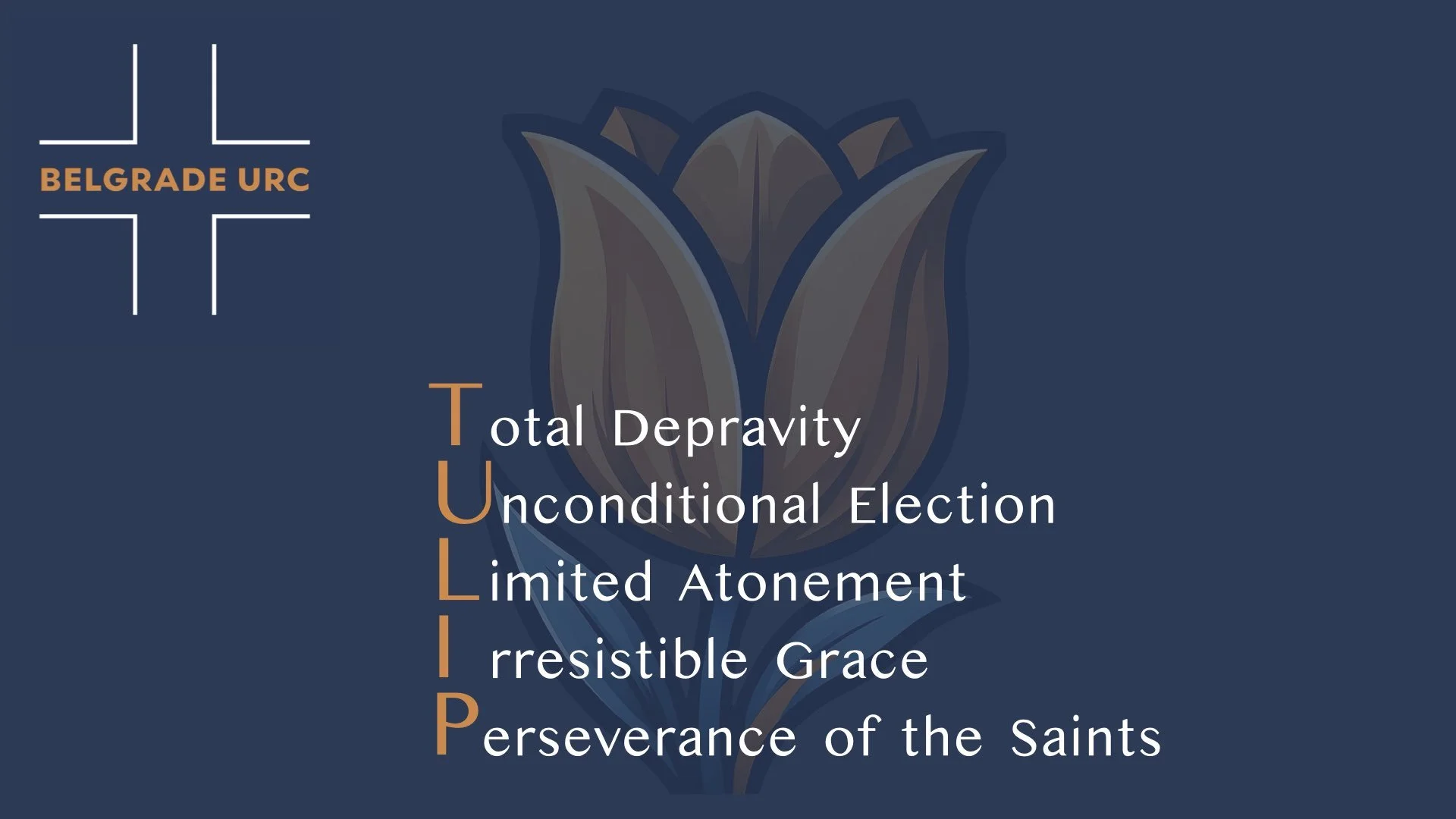Worship 10 am & 6 pm
Belgrade United Reformed Church
17333 Frontage Road
Belgrade, MT 59714

Persevere in God's Preservation (1 Peter 1:3-9; COD Head 5)
The Christian life is not easy sailing, but a journey of perseverance upheld by God’s preserving power. Anchored in Christ, refined through trials, and guarded by God’s strength, believers press forward with confidence, knowing their inheritance is secure and their Savior faithfully preserves them.

Called to Persevere (Psalm 32; COD Head 5 Arts 1-8)
Psalm 32 shows us that perseverance is not spiritual cruise control. David knew the misery of hidden sin, the crushing weight of God’s discipline, and the joy of restored fellowship. His story teaches us that God does not abandon His people when they fall, but lovingly presses them toward repentance and renewal. The Canons of Dort echo this same hope: believers may stumble, but the Lord faithfully brings them back, preserving them by His grace until the end.

Called to Willingly Obey (Philippians 2:12-18; COD Head 3, 4 RE 6-9)
This post explores Philippians 2:12–13 and the Canons of Dort, showing that salvation and obedience flow from God’s transforming grace. Grace doesn’t just offer help—it renews the heart, empowering believers to live faithfully in Christ. We work because God works in us, producing joy‑filled obedience.

What is a Spiritual Person? (COD Heads 3,4; 1 Cor. 2:14-16)
Explore the profound contrast in 1 Corinthians 2 between the natural person, who sees the gospel as folly, and the spiritual person. The spiritual person is regenerated by the Holy Spirit and begins to conform to Christ's mind. Drawing from the Canons of Dort, this teaching dismantles misconceptions of "carnal" vs. "super-spiritual" Christians, revealing that true maturity rests in humble dependence on Christ's cross and resurrection. Grace doesn't merely assist; it radically renews hearts for joyful obedience. Discover how to live a discerning life through the gospel, for God's glory alone.

Passive and Mindless Muppets ? (COD Head 3,4; Acts 13:48)
We are not puppets but renewed people shaped by grace. The gospel’s sincere call both invites and transforms, revealing a sovereign Savior worthy of our trust and worship.

For Whom Does Christ Pray? (John 17:4, 9, 20-21; COD 2)
This sermon explores the doctrine of limited atonement through John 17, showing that Christ’s death is not a vague, potential redemption but a finished work for a particular people the Father has given Him. Rather than fueling elitism, this truth humbles believers: faith does not save us; Christ saves. Faith is the Spirit’s gift that compels us to cling to Him to receive all Christ’s distinct benefits. Christ’s high priestly prayer reveals His heart. Christ prays for his people. Christ desires eternal fellowship with the people that God has given to Christ. This does not make us complacent, but we live in the confidence that Christ’s work will complete his intended result.

Scarcity or Abundance? (John 10:15; COD Head 2)
The doctrine of Limited Atonement is often misunderstood as if Christ’s sacrifice were scarce or restricted. Yet Scripture reveals the opposite: Jesus’ atonement is infinitely sufficient for all, but applied only to His sheep. those who hear His voice and follow Him. This truth isn’t about exclusivity but assurance. The Good Shepherd laid down His life intentionally, securing salvation for His flock and lifting sinners from the depths by grace alone.

It's God's Kingdom and His Choice (Ephesians 2:1-10; COD Head 1)
The Canons of Dort reject the Arminian view that human choice influences God’s election. Instead, they affirm that election is entirely of God’s grace, based on His purpose and love, not on foreseen faith or works. This doctrine emphasizes God’s sovereignty, personal intervention, and unchangeable love, ensuring that salvation is entirely His work and all glory belongs to Him.

More Gracious Than We Can Imagine (Romans 9:6-13; COD Head 1 Articles 7, 15)
The Canons of Dort present election as a deeply loving act of God. Election is rooted in His mercy, not our merit, ensuring that His people will enter His rest despite our sin and rebellion. Romans 9 reminds us that salvation is grounded in God’s sovereign will, not human effort. This doctrine offers profound comfort: the elect care about Christ because the Spirit is at work in them, and God’s mercy guarantees their salvation.

Introduction to The Canons of Dordt: Five Points of Calvinism
This week we began a series on the Canons of Dort, exploring the five points of Calvinism. These doctrines—Total Depravity, Unconditional Election, Limited Atonement, Irresistible Grace, and Perseverance of the Saints—show God’s sovereign, transforming grace. Far from prideful or fatalistic, they call believers to humility, worship, and confidence in God’s faithful work.











